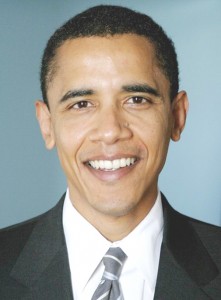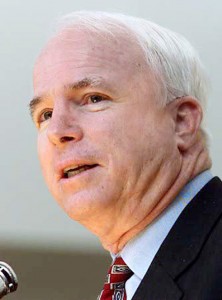By Wayne Brown
As the reader may have noticed, this year’s presidential election is almost entirely about Barack Obama — so much so that poor John McCain only ever seems able to get attention when he’s talking about the junior senator from Illinois — a fact that’s, ironically, resented by both sides.

The McCain camp points to the obvious bias in media coverage — the US networks’ newscasts (combined audience, 20 million) have spent 114 minutes on Obama since June, against 48 minutes on McCain — to rehearse the Republicans’ old war cry against the ‘liberal’ media. And the pro-Obama blogs protest that this focus has allowed McCain to get away unchallenged with all manner of old man gaffes — confusing the Sunni and the Shia in Iraq, repeatedly calling the Czech Republic “Czechoslovakia,” mixing up Somalia and Sudan — and “ugly American” quips. (Told last week that American exports of cigarettes to Iran had risen tenfold during the Bush administration’s tenure, McCain ‘joked’ that that was one way of “killing Iranians.”)
There’re reasons why this should be so.
After eight years in which the Bush administration — rubber-stamped by a Republican Congress — comprehensively debased the US political system and America’s image in the world, threw fiscal discipline to the wind, gratuitously got that country’s once-vaunted military hopelessly bogged down in Iraq, and presided over runaway oil prices and the current crisis in the US economy, most Americans have had it with the Republican brand, at least for now.

And then there’s Obama: an extraordinary “demi-angel” (Peter Minshall), the giant-killer of the combined Clintons, as graceful in mind as he is in body — Obama is indubitably the brightest presidential candidate in living memory — and, incidentally, a standing rebuke to Colin Powell, who cannot help but see in him how differently his own life might have gone if he hadn’t wimped out in ’96 through fear of assassination and instead let himself be used, disgraced and discarded by the Bush-Cheney cabal in their profitable attack on Iraq.
Above all, though, the African-and-American Obama is a question mark suddenly confronting the soul of America. And the question he cannot help but pose — just one generation after Martin Luther King and the civil rights’ movement, and with more than a million African-Americans currently languishing in American jails — has so far been eliciting quite equivocal responses in some quarters.
One suspects it’s partly responsible for a cautionary twist in the most recent polls. Amid other stats giving Obama a steady single-digit lead, a CBS/Times Poll last week showed a rise in undecided voters to12 per cent, double what it was a month ago. And a Quinnipiac poll showed the same trend: the number of undecided voters had risen to 14 per cent from eight per cent two months ago.
This, coming at a time when normally the ranks of the Undecideds should be thinning out, not increasing, suggests how ‘exotic’ Obama still seems to many Americans. They appear by and large to like him, but they don’t quite trust him. They’re not quite sure who he is. (Hence the Obama campaign’s understandable fury at the New Yorker’s ‘satirical’ cover last week, depicting Obama as a radical Muslim and Michelle Obama as a coy but armed Angela Davis.)
In this regard, Obama may have hurt himself by his emphatic move to the right last month. Granted, he may have calculated he couldn’t vote against FISA and then have to sweat out the risk of another terrorist attack before November 3. Granted that after his ‘bitter-cling’ gaffe back in April — and his subsequent drubbing by Hillary in Pennsylvania and other Rust Belt states — he may have seen political necessity in reversing himself on gun control and embarking on his own faith-based initiative. But the cumulative effect of such position-reversals may well have been to blur his image and leave many Americans asking — some for the first time — Who’s this guy, really?
Since early June, Obama’s ‘flipflop’ label has gained some traction. Wrote Tony Blankley on The Cagle Post last week, scathingly:
“Apparently, the change [Obama] was calling for was not for Washington politics, but for his primary campaign positions. Abortion, gun control, capital punishment, FISA laws, the status of Jerusalem, faith-based federal programs, public financing of his campaign, welfare, NAFTA and free trade, and his commitment to the Rev. Jeremiah Wright and his Trinity Church all have fallen to reconsideration, rephrasing, changed rhetorical modulation, and other semantic miracles. His Iraq position is currently in the process of glissading from anti to pro, so we will have to wait for a while before saying he actually has changed it.”
And to flipflopper has been added, from the right, accusations of hubris and narcissism. In ‘The Audacity of Vanity’, the Washington Post’s neocon columnist Charles Krauthammer, citing Obama’s wish to speak before the Brandenburg Gate on his trip to Europe, wrote scornfully on Friday:
“Americans are beginning to notice Obama’s elevated opinion of himself…In his victory speech upon winning the nomination, Obama declared it a great turning point in history — ‘generations from now we will be able to look back and tell our children that this was the moment’ — when, among other wonders, ‘the rise of the oceans began to slow.’ [And then there are] the words of his own slogan, ‘We are the ones we’ve been waiting for,’ which, translating the royal ‘we,’ means: ‘I am the one we’ve been waiting for.’ Amazingly, he had a quasi-presidential seal with its own Latin inscription affixed to his lectern, until general ridicule — it was pointed out that he was not yet president — induced him to take it down.”
Concluded Krauthammer: “For the first few months of the campaign, the question about Obama was: Who is he? The question now is: Who does he think he is?”
That last may be wishful thinking on Krauthammer’s part; Obama’s lead in the polls remains steady. But the Golden Boy, whose occasional cockiness is noticeable even to his supporters, may need to be wary: the charge of narcissism may secrete just sufficient truth to enable it to take wing.
Not coming across as uppity won’t be easy for Obama, however; he is, after all, the Rock Star president not just a new generation of Americans but the world has been waiting for. When he leaves presently on his tour of Iraq, Afghanistan, Israel, Palestine and Europe — a tour fraught both with risks, especially in Israel, and opportunities, especially in Europe — Obama will be met at his stops by the big names of the US television media — NBC’s Brian Williams, ABCs’ Charles Gibson, CBS’s Katie Couric — as well as being accompanied en route by “star political reporters from the major newspapers and magazines,” all promising a level of coverage that would be extraordinary, even for a president.
Except, of course, that, after all’s said and done, this is an extraordinary — and fateful — moment in American history.






